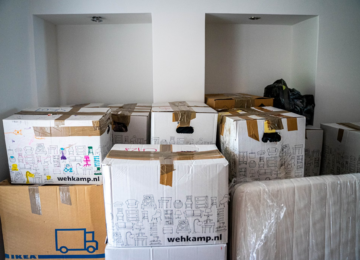Moving can be a daunting task, filled with decisions, preparations, and uncertainties. Whether you’re relocating across town or to a different state, there’s no denying that it’s a significant life event. It’s a time when you need to consider everything from packing your belongings to finding the right moving companies. While all moves come with their unique challenges, local moves, in particular, hold a special place in the moving landscape.
Local moves, often viewed as less complex than long-distance or out-of-state relocations, still require careful planning and attention to detail. They may not involve crossing state lines, but that doesn’t mean they come without their share of considerations. From a logistical standpoint, local moves can be just as intricate as their long-distance counterparts. Let’s explore why local moves matter and how they impact your moving experience.
Preparing for a Local Move
Before the moving day arrives, it’s essential to make thorough preparations. Here’s how you can ensure a smooth transition:
Assessing Your Belongings
Assessing your belongings is the first crucial step in preparing for a local move. Go through every room, closet, and storage space to determine what you want to keep, donate, or discard. This process not only lightens your load but also helps you save on moving costs. Additionally, consider creating an inventory list to keep track of your items and their condition.
Planning Your Packing Strategy
Once you’ve decided what to take with you, it’s time to plan your packing strategy. Start by packing items you don’t use daily, such as seasonal items and decor. Be sure to label your boxes clearly, indicating the contents and the room they belong to. This organization will make unpacking a breeze and reduce the risk of misplacing items. Additionally, pack an essentials box with everyday necessities like toiletries and important documents to have readily accessible.
Securing the Right Supplies
To ensure a smooth packing process, you’ll need the right supplies. Stock up on sturdy boxes, packing tape, bubble wrap, and packing paper. Invest in quality packing materials to protect your belongings during transit. Moreover, consider using color-coded labels to further streamline the unpacking process and prevent mix-ups. Don’t forget to acquire specialty packing materials for fragile or valuable items.
Navigating the Logistics
The logistics of a local move can be just as complex as a long-distance one. Here’s how to navigate them effectively:
Selecting the Right Moving Company
Choosing the right moving company is crucial for a stress-free move. Research local movers and read reviews to find a reputable one. Get multiple quotes and compare services to ensure you’re getting the best value for your money. Additionally, inquire about any insurance options they may offer for added peace of mind, and verify their licensing and credentials.
Coordination and Scheduling
Coordinate with your chosen moving company well in advance. Discuss your moving date and any specific requirements you may have. Scheduling your move during off-peak times can often save you money and reduce the chances of delays. Keep a detailed timeline to stay organized throughout the process, and consider creating a backup plan for unforeseen circumstances.
Addressing Unexpected Delays
Despite careful planning, unexpected delays can still occur. Weather, traffic, or last-minute changes can disrupt your moving schedule. Have a contingency plan in place and stay flexible to adapt to unforeseen circumstances. Consider having a backup moving date in case the need arises, and maintain open communication with your moving company to address any issues promptly.
Managing Emotional Stress
Moving isn’t just physically taxing; it can also take an emotional toll. Here’s how to manage the emotional challenges that come with a local move:
Saying Goodbye to Familiar Places
Leaving behind a home and neighborhood you’ve grown attached to can be emotionally challenging. Take some time to say goodbye to your favorite spots and neighbors, and capture memories through photos or keepsakes. Additionally, consider hosting a small farewell gathering to cherish those final moments and create lasting memories.
Coping with the Transition
Adjusting to a new environment can be unsettling. Try to establish routines in your new home and explore your new neighborhood to familiarize yourself with your surroundings. Building a sense of community in your new area can also help ease the transition. Seek out local clubs or organizations to connect with new people, and don’t hesitate to reach out to neighbors for a friendly introduction.
Dealing with Unforeseen Hiccups
No move is without its hiccups. From misplaced items to unexpected repairs, be prepared to handle unforeseen challenges with patience and adaptability. Keep a list of important contacts, such as local service providers, to assist you in case of emergencies. Remember that flexibility and a positive attitude go a long way in managing unexpected situations. Keep a dedicated folder with essential documents and contact information for easy access.
Unpacking and Settling In
Once you’ve arrived at your new home, the work isn’t over yet. Here’s how to tackle the final stages of your local move:
The Importance of Organization
When unpacking, prioritize the essentials and tackle one room at a time. Use the labeling system you implemented during packing to guide you. An organized approach will help you settle in faster and reduce the stress of searching for items. Consider setting up a dedicated unpacking station to keep things efficient and avoid clutter.
Setting Up Your New Space
Take the time to arrange your new space to your liking. Experiment with furniture placement and decor to make it feel like home. Create a comfortable and inviting atmosphere that suits your lifestyle. Additionally, take a moment to celebrate your move’s success with a housewarming gathering for friends and family. Share your joy and new beginning with loved ones.
Post-Move Adjustments
After you’ve settled in, it’s essential to make post-move adjustments as needed. Pay attention to any areas that require repairs or improvements, and take steps to address them promptly. Also, take advantage of the opportunity to explore your new community and discover hidden gems. Join local clubs or organizations to further integrate into your new surroundings and make lasting connections.
In conclusion, local moves may seem less complex than long-distance ones, but they come with their unique set of challenges. By assessing your belongings, planning your packing strategy, securing the right supplies, selecting the right movers, coordinating logistics, managing emotional stress, and approaching unpacking and settling in with organization.
You can overcome these challenges and make your local move a successful and satisfying transition to your new home. Remember that with proper planning, a positive mindset, and attention to detail, even the most surprising challenges of local moves can be conquered.











